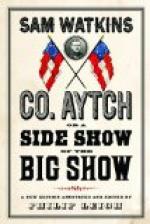He was not the first young man she had met with schemes for writing original music. So far as she was capable of judging, his practice was better than his theory. But his music was not the origin of her interest for him. What really interested her were his beliefs; her personal interest in him had really begun when he had said that he believed in a continuous revelation. Of this revelation he had argued that Christ was only a part. These ideas, which she heard for the first time, especially interested her. Owen’s agnosticism had given her freedom and command of this world, but it had made a great loneliness in her life which Owen was no longer able to fill. Life seemed a desert without some form of belief, and notwithstanding her success, her life was often intolerably lonely. She had often thought of the world’s flowers and fruits as mere semblance of things without true reality, and what seemed a bountiful garden, a mere hard, dry, brilliant desert. It was only at certain moments, of course, that she thought these things, but sometimes these thoughts quite unexpectedly came upon her, and she could no longer conceal from herself the fact that she was lonely in her soul, and that she was growing lonelier. She was wearying a little of all the visible world, beginning to hunger for the invisible, from which she had closed her eyes so long, but which, for all that, had never become wholly darkened to her.
Hearing Ulick speak of foreseeing and divinations by the stars was, too, like sweet rain in a dying land; and as they returned to Dowlands, she spoke to him of Moy Mell where Boadag is king, of the Plain of the Ever Living, of Connla and the Fairy Maiden gliding in the crystal boat over the Western Sea, and during dinner she longed to ask him if he believed in a future life.
It was difficult for her, who had never spoken on such subjects before, to disentangle his philosophy, and it was not until he said that we must not believe as religionists do, that one day the invisible shall become the visible, that she began to understand him. Such doctrine, he said, is paltry and materialistic, worthy of the theologian and the agnostic. We must rather, he said, seek to raise and purify our natures, so that we may see more of the spiritual element which resides in things, and which is visible to all in a greater or less degree as they put aside their grosser nature and attain step by step to a higher point of vision. She had always imagined there was nothing between the materialism of Owen and the theology of Monsignor. Ulick’s ideas were quite new to her; they appealed to her imagination, and she thought she could listen for ever, and was disappointed when he reminded her that she must practise the Bach sonata for the evening’s concert.
It did not, however, detain them long, for she found to her great pleasure that she had not lost nearly as much of her playing as she thought.




